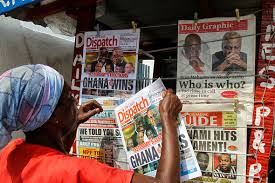APA – Accra (Ghana)
The report that President Akufo-Addo has said that the continuous investment in a modernised robust logistics chain infrastructure is one of the surest way of catapulting the country into becoming the world’s leading exporter of agricultural produce, is one of the leading stories in the Ghanaian press on Friday.
The Ghanaian Times reports that President Nana Addo Dankwa Akufo-Addo says the continuous investment in a modernised robust logistics chain infrastructure is one of the surest way of catapulting the country into becoming the world’s leading exporter of agricultural produce.
He noted that despite the huge potential in the area of agriculture due to favourable weather conditions, ample water supply and fertile lands, the country was yet to assert itself as one of the leading exporters of agricultural produce due to the lack of robust chain infrastructure.
“I believe firmly that Ghana has the potential to become the world’s leading exporter of agriculture produce, thanks in part to favourable weather conditions, ample water supply and fertile land. However, what we have lacked over the years is a modernised robust logistic chain infrastructure required to help realise this potential,” he emphasised.
President Akufo-Addo disclosed this at the inauguration of 15 additional gantry cranes for the operations of Meridian Port Services (MPS) at Tema on Wednesday.
The inauguration of the gantry cranes also initiated the second phase of the Tema port expansion project which would increase its capacity from the current one million square metres to 1, 270,000square metres.
The newspaper says that this year’s Youth Employment and Entrepreneurship (YEE) Global Forum aimed at promoting entrepreneurship among African youth and tackling unemployment has ended in Accra.
The two-day event was organised by SNV Netherlands Development Organisation as part of its European Union-funded, Boosting Green Employment and Enterprise Opportunities in Ghana (GrEEn) Project in the Greater Accra Region.
It was held on the theme “Building Partnerships for Inclusive and Sustainable Youth Employment and Entrepreneurship in Green and Emerging Sectors.”
The event brought together young people from about 10 African countries to share ideas on job opportunities within several sectors including agriculture, production and manufacturing.
It was also aimed at contributing to the policy environment needed for jobs creation in Africa through sharing evidence and research results while providing networking opportunities to promote partnerships between young people.
Speaking at the opening ceremony on Tuesday, the SNV Country Director, Barbara White Nkoala, said they were delighted to hold the forum to provide an opportunity for all stakeholders, government, development partners and the youth to come together and share experiences and recommendations to foster economic growth.
“It is arguably the best way to support youth employment and enterprise as we continue to work in partnership with the government through the Ministry of Employment and Labour Relations, Local Government and Rural Affairs and other stakeholders committed to youth development,” she stressed.
Mr Nkoala said the organisation was currently working on the Green Jobs Strategy with the government and urged all stakeholders to get on board to achieve the desired results.
”We need a collaborative effort to ensure that the goal of the forum is achieved. The Green Project has been operating for four years and it is important to invest into the area. We have listened to the youth and committed to addressing their challenges,” she stated.
The Graphic reports that Ghana has won the best Stand for creativity at the Intra- African Trade Fair in Cairo, Egypt which ended on Wednesday.
Nigeria won the overall best stand and other countries won in other categories.
The award was presented at the closing ceremony and received by the Director of Marketing, Mr George Ameyaw, GEPA, on behalf of the CEO, Dr Afua Asabea Asare.
In his closing remarks, the chairperson of the IATF advisory council, Jean-Louis Ekra said he was happy about the success of the fair especially because it showed the immense potential of Africa.
He said the fair allowed Africa to share its stories, struggles and successes and also opened new doors.
He asked participants to reflect on the achievements of the fair and work in furtherance of the partnerships forged at the fair.
In all, 1650 exhibitors from 45 African countries with 42 pavilions participated in the fair on the theme, “Connecting African Markets”.
The newspaper says that the government has made a provision of GH¢4 billion to address the liquidity issues of the National Investment Bank (NIB), and other distressed Special Deposit taking Institutions (SDIs) in the country.
The amount which was announced in the 2024 budget is also expected to take care of some outstanding legacy challenges in the financial sector.
This forms a critical component of the three-year International Monetary Fund Programme.
Under the IMF programme, the Bank of Ghana (BoG) has committed to completing the remaining tasks from the financial sector cleanup, and these tasks include addressing the insolvency of NIB as well as the long-standing under-capitalisation of several special deposit-taking institutions (SDIs).
Addressing the media at the Monetary Policy Committee press conference in July, the Governor of the Bank of Ghana, Dr Ernest Addison, said the issue of NIB and other under-capitalised institutions would o
He said once the government was done with the immediate issues of the impact of the Domestic Debt Exchange Programme (DDEP) on banks, it would go back and relook at these institutions and make an assessment on whether they are still viable or not.
“The NIB is one of the banks that we will make that assessment on, to ascertain whether it is still viable or not. If it is viable and the government can find money to recapitalise it, then Yes. But if it is not viable, then, obviously, we will have to find a different use for that instrument.
“These are ongoing discussions between us and the international partners and I believe that in the next year or so, we will get a clearer sense of how to handle those particular institutions that are very weak,” he stated.
GIK/APA


